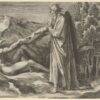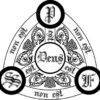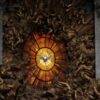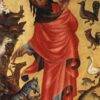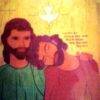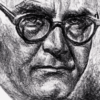Tag: Word
The Spoken Word of God Theology for Us: On a Dialogical Theology
Dialogical theology. It is one of our theses we put forward in our first Evangelical Calvinism book. What is it; what are its entailments; and why am I such a strong proponent of it? In nuce, dialogical theology is exactly what it sounds like: it is a theological “method” that allows the object of theology, who is also Subject for us, to confront us, to speak to us first that we might speak to Him; that we might come to know Him as He knows Himself from a center in Himself for us in Jesus Christ. So, this approach, this…
An Even Quicker Word on the Trinity: Generation
The Father, Son, and Holy Spirit are in-generate in their inner and eternal being. Some want to think in terms of an origin of relation, and thus call the Father in-generate and the Son and Holy Spirit, following, generate. Here we get the notion of “eternal generation,” with the Father as the aitea or source of the Godhead. I affirm eternal generation, but only in a liminal way. That Father isn’t anymore the Father than the Son is the Son in relationship to the Father and vice-versa. This is a necessary and eternal relationship that resists, ultimately, the idea of…
Barth’s Analogy of the Filioque for His Theology of the Word
Karl Barth, in his Göttingen Dogmatics, takes from neo-Reformed Dutch theologian’s, Herman Bavinck’s notion of Deus dixit (‘God has spoken’), as a way to think about the way God has revealed Himself bound up in a radical doctrine of the Word of God. Many have probably heard of Barth’s threefold form of the Word of God; it is in the early years of his time at Göttingen that this line of thinking got started for him; particularly as he was pressed upon to teach a Reformed dogmatics within a Lutheran setting. The following showcases the way Barth articulated his understanding…
A Spoken word Poetics on the Living Word of God
As a radical Protestant I am a theologian of a radical theology of the Word. This means that I first understand the Word, to be the eternal Logos, the begotten Son in the bosom of the Father. I understand his free election (Deus incarnandus) to be for us to entail what has become the written and proclaimed Word. So, the creaturely media, such as written and proclaimed Words are, in order, at least for the former to be living and active, requires that its res or reality be antecedently given in and from the eternally living and active Word of…
The Absence of God and the Rejection of the Self-Projected God: A Word to the Atheists and Theologians Alike
I happen to believe this. So, what do I happen to believe, you ask? That atheists, when they say they reject God, aren’t rejecting the living God because they can’t without first knowing God; and they can’t first know the living and real God without the Spirit; and if they had the Spirit they would be a Christian; but since they don’t have the Spirit they aren’t Christians; and thus have no capacity to reject the real God. They instead only have the capacity to reject a god who is really just a projection of themselves; no matter how many…
Torrance’s Theological-Exegetical Gloss on Romans 8:31-39: And a Word of Encouragement About God’s Unrelenting Love For Us
As I have been rereading TF Torrance’s The Christian Doctrine of God: One Being Three Persons, I came across a passage that struck me as a sort of theological-exegetical gloss of Romans 8:31-39. Torrance is often accused of not doing any biblical-exegetical work; but I would counter, that in his role as a Christian Dogmatist his work is saturated in the thematics that allow Scripture to say what it does about God and His works. I would contend that, Torrance, as a Christian Dogmatist, par excellence, has Scriptural themes and their reality in Christ, pervading all of his writings. What…
Devotional: Star Word – Curiosity
By Kayla Zopfi, 2022-23 Hunger Advocacy Fellow [about the author] They were prodded by a desire to know. The magi who journeyed to baby Jesus were likely some of the only people who noticed this bright new star in the sky, and they took off with excitement and energy even still. Story of the Magi This past Sunday at my young adult and queer-led Synodically Authorized Worshiping Community (SAWC) in Northeast Minneapolis, Tree of Life Lutheran, we did Lectio Divina on the story of the magi. I couldn’t help but reflect on the virtue of curiosity. Curiosity about an anomaly…
A Critique of John MacArthur’s ‘Word Faith Theology’: On the Relationship Between Five Point Calvinism and Human Psychology
I work the graveyard shift at work. I have a work vehicle I drive around in all night. And so, I often will listen to Christian radio. The lineup of pastors they have preaching throughout the night includes John MacArthur’s Grace To You broadcast. The broadcast for January 6th, 2023 was a sermon MacArthur originally delivered back in 1989. The sermon title is: Spiritual Stability, Part 3: Humility and Faith—Phil. 4:5-6a. So, he’s clearly going to be discussing anxiety, and its cure by trusting and resting in Christ. And absolutely, the Lord, as we humbly and boldly come to His…
Logos asarkos, Word without Flesh
Barth’s theology is often tagged as postmetaphysical in line with something like Kant’s, and more to the point, post-Kantian mediating theologians like Albrecht Ritschl, Wilhelm Hermann et al. But this is overwrought in the sense that Barth might be a trained modern theologian, nevertheless he is conditioned more by his reliance on the antique tradition found in the patristic past, and into the modern post reformed orthodox development of Protestant theology in Western Europe. Because of his influences we get a smattering, as Bruce McCormack might say, of a Barth who is both Orthodox and Modern. In this post we…
My Final Word on My PhD Status
I have decided to go ahead and pursue the PhD in theology (Reformed Dogmatics) with Martin Luther School of Bible and Theology. It has taken me time to process, research, pray, and reflect how I should go about this. In the end this PhD is what the Lord has set before me. Martin Luther School of Bible and Theology is the Divinity School (we could say) of the General Lutheran Church (denomination) based in San Juan, Puerto Rico. The denomination itself has existed since 2014, and claims to be the offshoot of the descendants from the former Evangelical Lutheran General…
